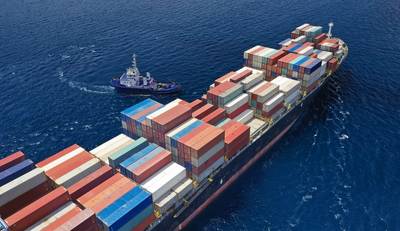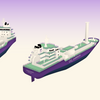Container Rates Soar on Concerns of Prolonged Red Sea Disruption
Container shipping rates for key global routes have soared this week, with U.S. and UK air strikes on Yemen stirring concerns of a prolonged disruption to global trade in Red Sea, one of the world's busiest routes, industry officials said on Friday.
U.S. and British warplanes, ships and submarines launched dozens of strikes across Yemen overnight in retaliation against Iran-backed Houthi forces for attacks on Red Sea shipping, widening regional conflict stemming from Israel's war in Gaza.
Most container ships are avoiding the nearby Suez Canal - a shortcut from Asia to Europe for almost one-third container ship cargo. The latest escalation fueled worries that oil tankers and bulk carriers that ferry vital commodities like grain could also avoid the shortcut, risking a new round of global inflation.
The benchmark Shanghai Containerized Freight Index was up over 16% week-on-week to 2,206 points on Friday. The index, which measures non-contract "spot" rates for container shipments out of China's ports, has gained 114% since mid-December.
Rates on the Shanghai-Europe route rose 8.1% to $3,103 per 20-foot container on Friday from a week earlier, while the rate for containers to the unaffected U.S. West Coast soared 43.2% to $3,974 per 40-foot containers week on week, leading ship broker Clarksons said on Friday.
"The longer this crisis goes on, the more disruption it will cause to ocean freight shipping across the globe and costs will continue to rise," Peter Sand, chief analyst at freight platform Xeneta, said in Friday.
"We are looking at months rather than weeks or days before this crisis reaches any kind of resolution," he said, referring to the growing conflict.
Major container ship owners such as Maersk and Hapag-Lloyd have switched Suez Canal-bound ships to the longer route around Africa's Cape of Good Hope. This has disrupted complex vessel schedules, delayed cargo and sent shipping costs sharply higher.
It is likely oil tankers and other types of ships will follow in higher numbers in the near term, Jefferies analyst Omar Nokta said in a note on Friday.
Major importers already are reporting fallout from the Red Sea crisis.
Tesla on Thursday said it would temporarily suspend most car production at its factory near Berlin after Red Sea-related diversions led to a lack of components. Global furniture seller IKEA also warned of potential product delays.
"The price of a vast range of goods threatens to march upwards again," said Susannah Streeter, head of money and markets, Hargreaves Lansdown.
Rerouting a ship around Africa adds roughly $2 million in fuel costs for each Asia-Northern Europe round-trip. Carriers are recouping that and rolling out other surcharges.
Container ship operators are pulling vessels into the most affected European and Mediterranean trade lanes to compensate for longer sailing times on rerouted ships. That is reducing available vessel space for cargo moving on Transpacific and North-South routes and sending costs on those trade lanes higher, Jefferies analyst Nokta said.
At the same time, customers told Reuters vessel operators are rationing less expensive, contract-rate space and forcing a portion of their shipments into the pricier spot market.
Meanwhile, the China Containerized Freight Index had its biggest jump on record on Friday in both nominal and percentage terms. The CCFI, which measures both spot and liner contracts, jumped 21.7% to reach 1,140 points, Nokta said.
(Reuters - Reporting by Jonathan Saul and Lisa Baertlein; additional reporting by Siddharth CavaleEditing by Josephine Mason, Mark Potter and David Gregorio)












